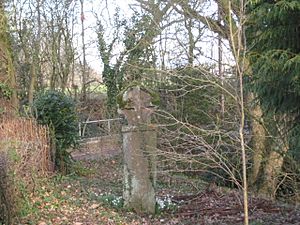Cross at Croes Llwyd Farm, Raglan facts for kids
Quick facts for kids Cross at Croes Llwyd Farm, Raglan |
|
|---|---|

"a very rare survival of a medieval boundary marker"
|
|
| Type | Cross |
| Location | Raglan, Monmouthshire |
| Built | late 16th century |
| Architectural style(s) | Vernacular |
| Governing body | Privately owned |
|
Listed Building – Grade I
|
|
| Official name: Cross at Croes Lwyd | |
| Designated | 31 January 2001 |
| Reference no. | 24716 |
| Official name: Cross at Croes Lwyd Farm | |
| Reference no. | MM156 |
| Lua error in Module:Location_map at line 420: attempt to index field 'wikibase' (a nil value). | |
The Cross at Croes Llwyd Farm is a very old stone cross located near Raglan, Monmouthshire. This special cross dates back to the Middle Ages, a time long ago. It was used to mark the edge of an important area called the Lordship of Raglan. Because it is so old and has survived for centuries, it is considered a very rare and important historical item. It is protected as both a Grade I listed structure and a Scheduled monument.
Contents
What is the Cross at Croes Llwyd Farm?
The Cross at Croes Llwyd Farm is a tall stone cross. It stands about 1.9 meters (over 6 feet) high. The main part of the cross, called the shaft, has eight sides. It is located on Broom Lane, which is east of Broom House. You can find it off the main road that goes from Raglan to Usk.
Why is this Cross Special?
This cross is very special because it has survived for hundreds of years. Most crosses from the Middle Ages were damaged or destroyed. The Cross at Croes Llwyd Farm is one of the few that still has its top part, or "head," intact.
A historian named Joseph Bradney wrote about it. He said it was "singularly well-preserved," meaning it was kept in amazing condition. Another writer and artist, Fred Hando, also wrote about the cross. He called it the "White Cross" because it used to be painted white. However, he thought "Grey Cross" would be a better name. He believed the cross was at least 500 years old!
The Cross's Purpose
The Cross at Croes Llwyd Farm likely had two main jobs. First, it might have been a preaching cross. These were places where religious leaders would stand and give sermons to people outdoors.
Second, and very importantly, it was a boundary marker. This means it helped show the exact borders of the medieval Lordship of Raglan. Imagine it like a very old signpost marking the edge of a territory.
A Moving Story
The cross has an interesting story about being moved. In the late 1800s, around 1870, it is thought that the cross was moved from its original spot.
There's a local story about a man who moved the cross to his garden. The story says that after he moved it, he had bad luck. His animals died, and things just didn't go well for him. He believed his misfortunes were because he had taken the cross. So, he moved it out of his garden and left it on some unused land. This old story shows how important and respected the cross was to local people.
 | Janet Taylor Pickett |
 | Synthia Saint James |
 | Howardena Pindell |
 | Faith Ringgold |

